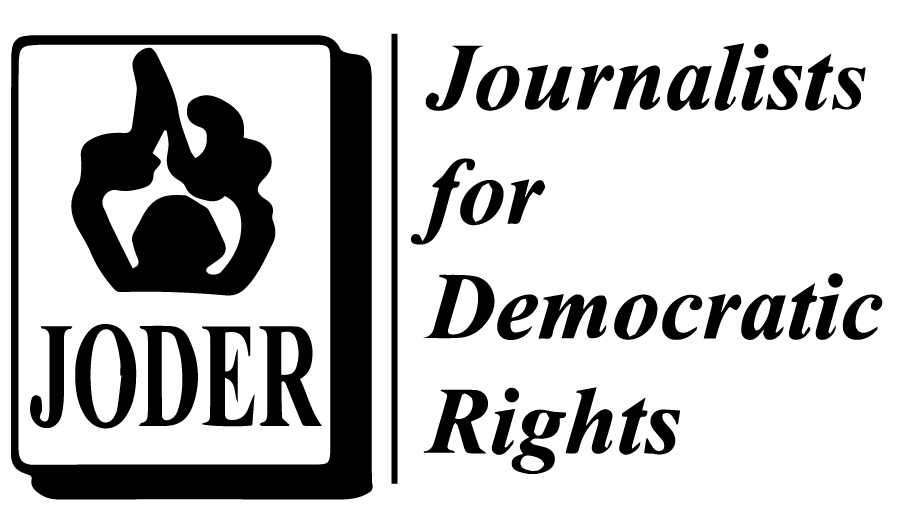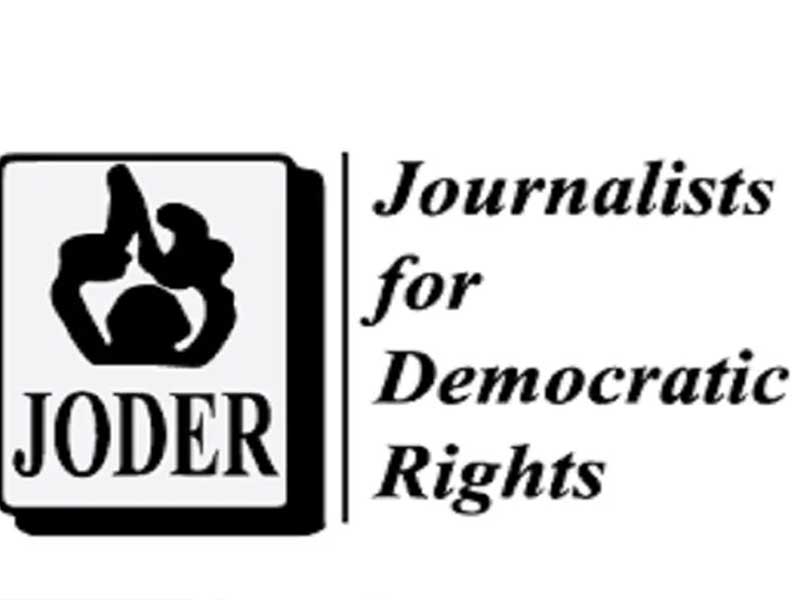Communique of the One Day Training on Reporting People With Disabilities, (PWDs) organised by Journalists for Democratic Rights, (JODER) with the support of the Ford Foundation West Africa Regional Office held in Lagos on May 09, 2023 at the M-Square Hotel, Ikeja GRA, Lagos
Preamble
The rights of People With Disabilities, (PWDs) is an important human right issue. Democracy and good governance are not complete without equitable focus on the rights of PWDs.
Disability is defined as ‘a physical or mental condition that limits an individual’s’ movements, senses, and activities.’ Children living with disabilities are denied access to the essentials of life including shelter, education and decent housing which imposes lack of self-esteem on them as they grow up;
In Nigeria, for decades, the issue of PWDs especially children remains a critical index of national, local socio-political and economic discourse.
Some were born with disabilities, while some grow to acquire the status of being physically less able. In all, children and adults being in a situation of less physical ability is not a choice by the person and does not mean the person is total unable. The 2006 National Census indicated that 3,253,169 Nigerians live with disabilities representing some 2.32 percent of the population at the time.
In 2011, a Global Report stated that some 25million Nigerians live with disabilities out of which 3.6 million face significant difficulties in functioning. As at 2023 in Nigeria, it is believed that there are some 27million people with disabilities.
Therefore, concerned about the disability issues in Nigeria, especially as they affect children, the Journalists for Democratic Rights, (JODER), in collaboration with civil rights groups working on disabilities with the support of the Ford Foundation organised a One Day training for print, electronic and social media with the Theme: Media Training and Capacity Building for Effective Coverage of Disability issues Especially as it affects Children.
Attendants at the meeting included physically challenged children and men,Development Communications Network, Committee for the Defence of Human Rights, Nigerian Human Rights Community, NIHRCO, Dreamland Foundation for PLWDs, Community Peoples Action Against, AIDs, (COPEAIDs), representatives of the Lagos State Government, Pacelli School for the Blind, Nigerian Automobile Technicians Association, (NATA), Centre for Democracy and Socio Economic Rights, CEDSER, Green Peoples Environmental Network, (GREPNET), Centre for Citizens with Disabilities, (CECD), members of the Nigerian Guild of Editors, Nigerian Union of Journalists, (NUJ), Labour among many others. 30 journalists participated in the training.
Two trainers, Mr David Anyaele of the Centre for Citizens with Disabilities and former Health Correspondent of The Guardian Newspapers, Mr Akin Jimoh served as resource persons.
Deliberations and Observations
- That disability issues are a critical aspect of human rights and sustainable development;
- That although the World Bank projects that people with disabilities constitute about 15% of populations in developing countries and that between 80-90% of them don’t gain access to basic needs in life especially basic education;
- Of concern are children living with disabilitiesin Nigeria, 18.5% children are out of school according to UNICEF, while the World Bank projects that people with disabilities constitute about 15% of populations in developing countries.
- Between 80-90% of them don’t gain access to basic needs in life especially primary education;
- That themost common disabilities in Nigeria are visual, hear, intellectual, communication and physical impairment. Other causes of disabilities globally are Arthritis, Ischemic heart disease, depression, cancer, stroke and Alzheimer among others
- Other causes are Chronic obstructive pulmonary disease (COPD), Down Syndrome as a result of genetic disorder, Brain Acquired Injury, spinal cord injury, bipolar disorder, Autism Spectrum Disorder, (ASD) and psychiatric disorder.
- That in Nigeria as in most African countries, some causes of disabilities include communicable diseases, war, terrorism trauma, accidents, congenital and non-infectious diseases.
- That disability in Nigeria is linked to poverty, lack of access to economic and social opportunities;
- That there are far from being enough institutions and centres for children with disabilities;
- That PWDs are at the lowest rank on the social and economic ladder;
- National, State and Local Government budget conception, planning and implementation take little cognisance of PWDs especially Children with disabilities;
- Education policies and the construction of Public schools, Public buildingsincluding State and National Assemblies across the country are with little or no considerations for PWDs;
- Education of children with disabilities are confined to very few, poorly staffed, poorly equipped and outdated special schools; in the public sphere, with low public awareness on issues of inclusive education, inadequate institutional and human capacities required to implement inclusive education orpoor implementation, or non-availability of appropriate legal policy frameworks required for the implementation of inclusive education for children with disabilities;
- PWDs are characterised by poverty, unemployment, exploitation, poor health and lack of representation;
- That there are perhaps hundreds of Nigerians who became physically less able due to the conflict in some parts of Nigeria;
- Participants recognise efforts of the Federal Government and some state governments in enacting the legal framework to promote and advance the rights of PWDs.
- Participants recognise that Nigeria already ratified the United Nations Convention on the Rights of Persons with Disabilities, the Draft Protocol to the African Charter on Human and Peoples Rights of PWDs, while at the local level, the Nigerian Government has signed into law the Discrimination Against Persons with Disability (Prohibition) Act 2018 plus the Lagos State Special People Law;
- Participants express concern about the implementation regime of the existing laws which remarkable impact are yet to be felt;
- Participants observed that in the last National elections, in the same pattern for previous ones, the Independent Electoral Commission, (INEC) did not make provisions for PWDs to enhance their capacity to vote with ease;
- Participants observed that during electoral seasons, the media engagement of political office seekers or holders often do not propel issues of disabilities while party manifestoes are less considerate on disability issues;
- That the media needs to be in the front burner of the campaign for the rights of PWDs and affected Children being part of its historic responsibilities to the society at large.
MEDIA COVERAGE OF PWDs
- That the media has done a lot in promoting the rights of PWDs but the efforts are far from being enough;
- That in some media spaces, PWDs are still considered as less important in the allocation of media space;
- Stories concerning PWDs are treated as sudden events not as a continuum of serious social and economic crisis that the state itself needs to address;
- Sometimes, in some media houses, disability stories are seen as ‘soft’ stories that should be in the backwater of the media spaces;
- Media advocacy for PWDs remains at its lowest ebb.
- The media does not constructively engage political leaders during election seasons on issues of disabilities;
- In many cases, the language employed by the media remains contemptuous with PWDs being referred to as ‘victims’, ‘disable’, ‘poor and desolate’, ‘beggars’ and even ‘hoodlums’ when ever they gather to express discontent against policies of the government;
- The media does not engage the tiers of governments enough on the place of PWDs on budget conception, planning and execution.
- The coverage of stories on building and structural development take less consideration of PWDs;
- Children living with disabilities are rarely taken into consideration in the coverage of education matter.
Recommendations
After exhaustive interaction, debate and fruitful discussions, the following recommendations were made at the end of the training:
- The Nigerian Local, State and National Governments should be constructively engaged on socio-economic policies like education, health and housing which affect the essential needs of PWDs;
- The media should increase the tempo of the campaign for access to free education and free health for Children living with disabilities;
- Tips on reporting reporting PWDs should be published and circulated in the print and electronic media across the country;
- Media institutions should further build the capacity of the media to raise issues of Children with disability to national consciousness;
- The media hereby form a National Media network to advance and Promote the socio-economic rights of PWDs in Nigeria;
- The media network will highlight the obligations of state institutions on socio-economic opportunities for Children living with disabilities;
- The Network will further develop the national media advocacy mechanism for promoting of the rights of children with PWDs;
- There should be a national media summit on reporting Children with disabilities with the focal point of reawakening national consciousness on their challenges;
- Participants express delight at the various lessons learnt during the training. They also thank the organisers, JODER, the Ford Foundation, West Africa Region and civil society groups working on disabilities for the training with a call that the training should be extended to other parts of Nigeria’s geo-political space.
Signed
Segun Abifarin
David Anyaele
Mrs Bukola George
Adewale Adeoye


